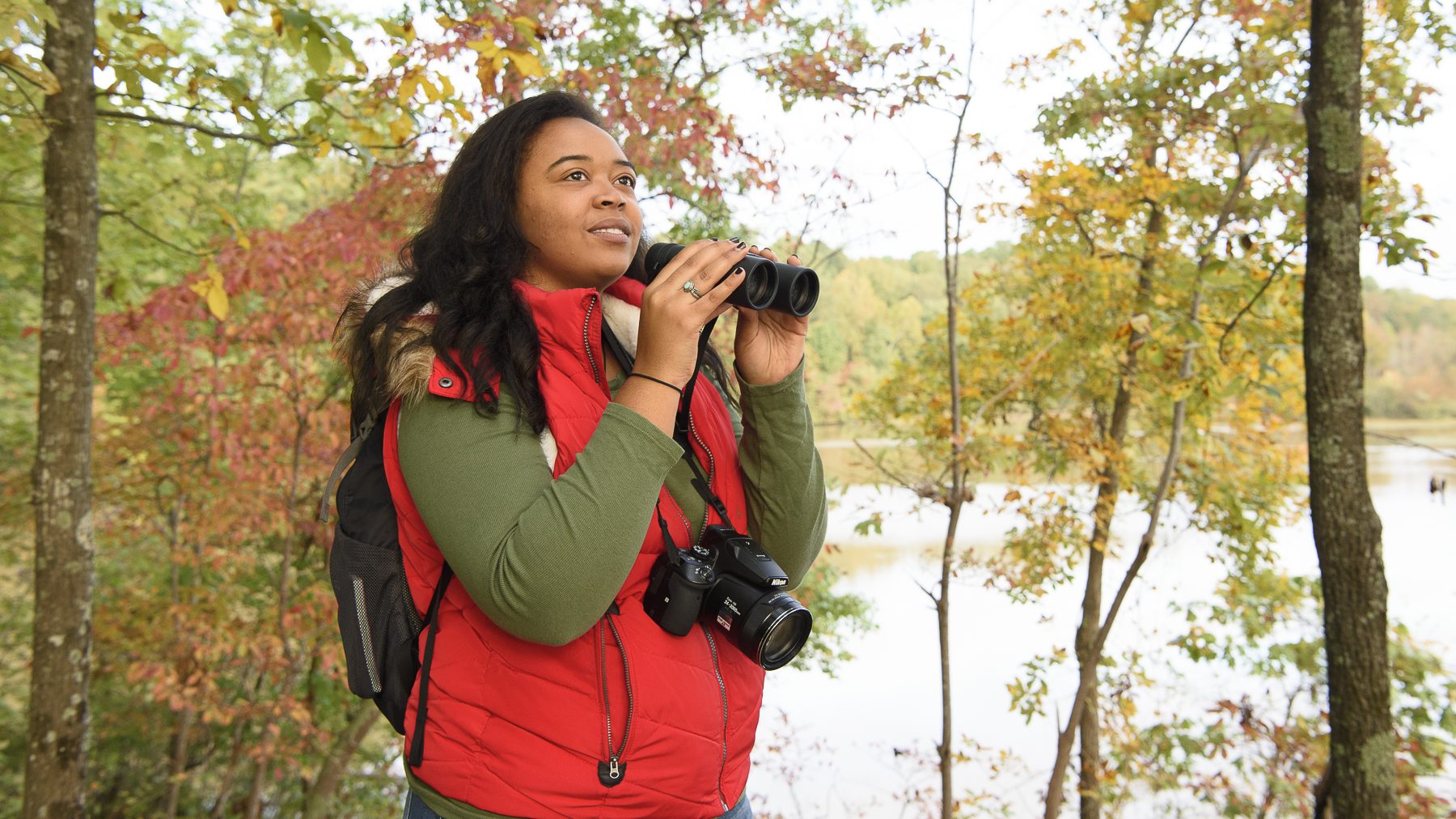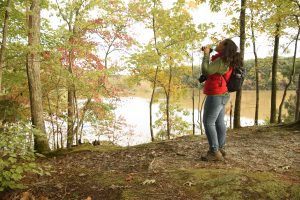Researcher Spotlight – Lauren Pharr

2021-22 Global Change Fellow
PhD student, Department of Forestry and Environmental Resources
Advisors: Drs. Caren Cooper and Christopher Moorman
Every year the Southeast Climate Adaptation Science Center funds a multi-disciplinary cohort of Global Change Fellows representing colleges across NC State University. The current cohort of students represents the decadal anniversary of this program! Here are some highlights about 2021-22 Fellow, Lauren Pharr, and the applied research she’s conducting.
About You
What do you study?
I am an avian ecologist who studies the effects of climate change on avian behavioral responses. My current research is looking at the potential impacts of both climate change and density dependent effects on nestling success in the federally endangered Red-cockaded Woodpecker. To do this, I will be analyzing multiple variables, including temperature, timing of prey arrival, extreme weather events (i.e. hurricanes), and fire history.
What is your dream job?
I am dedicated to species and habitat conservation and management. My ideal academic job will involve close collaborative ties, or even a joint position, with state and/or federal agencies. I hope to obtain a position in a Cooperative Research Unit at a state university where I will mentor graduate students into career positions across multiple sectors.
What are three words your friends would use to describe you?
An Over-achiever, a Multitasker, and very Organized.
About Your Research

What results are you finding?
Over the past several decades, Red-cockaded Woodpecker (RCW) densities increased due to intensive restoration and management of long-leaf pine forests and the strategic placement of artificial cavities. Over recent decades, RCW lay dates have advanced, producing larger clutches. Currently, elevated brood reduction, in light of larger clutches and other mitigating factors, does not affect overall productivity in North Carolina. However, the causes of the observed changes in reproduction may be relevant to declines in productivity that are occurring in the opposite, southwestern portion of the range, which might be a preview of the future in North Carolina.
Who will benefit from your research?
This study will reveal how both density-dependent factors and climate change impact partial brood loss, likely through the availability of food for, and/or microclimate experienced by nestlings, with broad implications for current and future population dynamics of species. I plan to collaborate with multiple government agencies and private groups including The Nature Conservancy and the Sandhills Conservation Partnership, to promote conservation of the longleaf pine system in the region; a system that provides multiple bird species, including the Red-cockaded Woodpecker, with food and habitat.
How can your research be used to inform management decisions?
My proposed research will fill a critical knowledge gap and make innovative contributions to the fields of climate change research, conservation biology, and population biology. The results of my work will further inform and guide the implementation of conservation efforts for multiple avian populations. This research will help to elucidate proximate causes of changing population dynamics of the Red-cockaded Woodpecker and quantify the potentially interacting effects of climate change, food availability, and disease.
About Your Global Change Fellow Experience
How do you expect the SE CASC Global Change Fellows Program to impact you and your work?
The SE CASC Global Change Fellows Program has given me the opportunity to make wonderful connections, and I’ve had the privilege to meet new people whom I probably would not have crossed paths with. Additionally, I’ve had the opportunity to identify additional collaborators whose areas of expertise could possibly help with specific portions of my research.
What has been the most rewarding part of being a Fellow?
Organizing and getting to be a huge part of the wonderful seminars we put on as Global Change Fellows has been one of the most rewarding parts. Not only do we get the chance to connect with and invite such wonderful speakers, but also getting to work with other fellows in our cohort has been amazing. I’ve made such beautiful connections with many of the fellows in my program, and I am so glad that our paths crossed.
What advice would you give to a student that is interested in getting involved in your field?
One of the hardest things about my field is the lack of diversity. I continue to do what I do in hopes that more minority individuals will see me, and see what I have accomplished, and therefore become inspired. Therefore, the best thing I can continue to do is to be a role model. See me and know that you can! That’s my best advice.